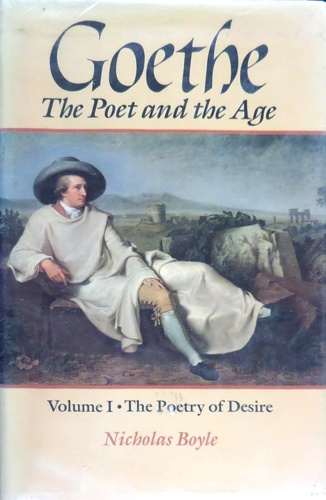 Boyle, Nicholas.
Goethe: The Poet and the Age : The Poetry of Desire (1749-1790).
Boyle, Nicholas.
Goethe: The Poet and the Age : The Poetry of Desire (1749-1790).
Oxford, At the Clarendon Press
1991,
cm.16x24,
pp.XVI,806,
legtaura editoriale cartonata, sopracoperta figurata illustrata a colori.
In 1880 Nietzche observed that Goethe had been "not just a good and great man, but an entire culture." The author of Faust, of exquisite lyric poetry, and of a bewildering variety of other plays, novels, and poetry as well as treatises on botany and color theory, Goethe also excelled as an administrator in the cabinet of Carl August, Duke of Saxe-Weimar. Now, Nicholas Boyle has written the definitive biography of this extraordinary figure--indeed, The Poet and the Age is the first full-length, original English-language biography of Goethe in sixty years.
In this elegant and enjoyable first volume--the first of two projected books--Boyle captures the passions and poetry of the young Goethe, leading us up to the moment when the French Revolution shook the foundations of all of Europe. Boyle contends that, although Goethe was certainly as much a part of German social and political life as he was its cultural nucleus, there was no single "Age of Goethe." Instead, Goethe's life spanned a great divide in European history: half was spent under a monarchy, and half under a middle-class bureaucracy. The first forty years of Goethe's creative life, rendered by Boyle in captivating detail, saw the early conception of Faust, and Goethe's rise to literary fame on the heels of his bestselling sentimental novel The Sorrows of Young Werther, a book which captured the European imagination like no other before it. Werther became a fashion in a strikingly contemporary sense: impassioned readers imitated the clothing, the sentiments, and even the tragic suicide of the novel's young hero. Napoleon claimed to have read Goethe's book seven times, and years later Mary Shelley cited it as the first book read by the monster she created in Frankenstein. Boyle provides not only close and provocative readings of Goethe's literary works, but also a vivid portrayal of a convulsive age of revolution, including insights into Weimar court life, and accounts of other master thinkers like Lessing and Schiller.
EAN:
9780198158660